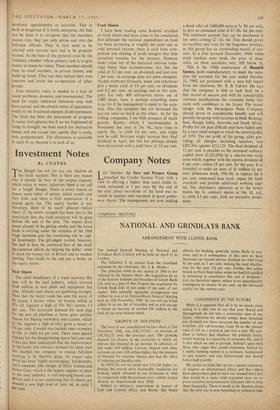Investment Notes
By CUSTOS
HE Budget has not yet cast any shadow on I the stock markets. Nor is there any reason why it should. In view of the surplus capacity which exists in many industries there is no call for a 'tough' Budget. There is every reason to expect some relief of surtax, which would cost very little, and there is little expectation of a capital gains tax. The equity market is not, therefore, likely to be much affected-before April 17. Its recent strength has been due to the conviction that the trade recession will be gone before the end of the year. The export drive seems already to be getting results and the home trade is reviving under the stimulus of the 1960 wage increases and the continuing rise in capi- tal investment. The gilt-edged market, however, has had to face the awkward fact of the mark Up-valuation which, by helping the dollar, tends to draw hot money out of Britain and so weaken sterling. This could in the end put a brake on the equity boom.
Steel Shares
The chief beneficiary of a trade recovery this Year will be the steel industry, which invested £146 million in new plant and equipment last Year. Already steel shares are gathering strength. Now that the motor trade has seen the worst of its slump, I favour STEEL OF WALES, which at 475. 3d. (against a high of 55s. 9d.) returns 5.3 Per cent. The increased demand for steel pipe for the new oil pipelines at home gives another reason for buying STEWARTS AND LLOYDS, which at 54s. (against a high of 63s.) gives a return of 5.6 per cent. I would also include JOHN SUMMERS at 65s. to yield 4.6 per cent. There were special reasons for the disappointing report last year and !t has just been announced that the improvement In the home and overseas demand for sheet steel has enabled the company to resume full-time working at its Shotton plant. Its export sales drive has been 'highly encouraging.' Incidentally, roAVY-ASHMORE (the merger of Davy United and Power Gas), which is the largest supplier of plant to the steel industry, is still enjoying boom con- ditions and it is not surprising that its shares are around a new high level of 166s. 6d. to yield 3 Per cent.
Food Shares
I have been reading some brokers' circulars on food shares and have come to the conclusion that although the national expenditure on food has been increasing at roughly the same rate as total 'personal income, there is such keen com- petition and shading of profit margins that little attraction remains for the investor. EXPRESS DAIRY come out of the statistical exercise some- what better than INTERNATIONAL TEA, but the yield of 3.2 per cent. on dividends and just over 7 per cent. on earnings does not seem adequate. ALLIED SUPPLIES (formerly HOME AND COLONIAL) give a better yield of 3.9 per cent. on dividends and 8.2 per cent. on earnings and as this com- pany has only 400 self-service stores out of 3,800 shops, there is perhaps something more to go for if the management is equal to the occa- sion. Also this company has not increased the pay-out ratio so much as the others. As for the milling companies, I see little prospect of much growth. RANKS, which I recommended in November last year at 24s. 9d., have risen to nearly 30s., to yield 4.6 per cent., and might now be sold. SPILLERS might increase their final dividend in April, but this has perhaps already been discounted with a yield basis of 3.8 per cent.






































 Previous page
Previous page